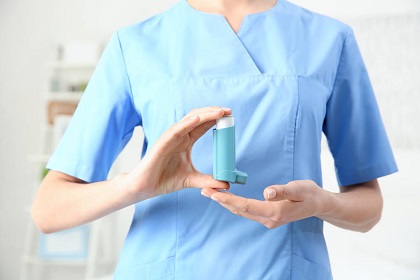Search
Related Articles

How to use Accuhaler
Step 1: Open• Hold your Accuhaler in one hand with the dose-counter
How to Use a Metered-Dose Inhaler and a Spacer
WHAT YOU NEED TO KNOW:What is a metered-dose inhaler and a spacer?A
Athletes’ Cardiorespiratory Functional Assessmen
Have you ever felt discomfort during exercise like shortness of brea
What are pulmonary function tests?
Diagnosis and assessment of lung function is one of the three major types of diagnosis for respiratory disease. Pulmonary function can be used for the early diagnosis of respiratory system diseases, identifying the causes of breathing difficulties, assessing the severity of a patient's condition, evaluating the efficacy of medicine and other treatments, assessing the degree of risk of thoracic and abdominal surgery, assessment of occupational pneumoconiosis, and monitoring of critical illnesses.
Pulmonary function tests are a kind of physical examination which are painless and do not cause any harm to the body. They are highly sensitive, can be performed many times, and patients readily accept such tests. Unlike chest X-rays and CT scans, pulmonary function tests focus on gaining information about changes in lung function. They are also more sensitive in measuring lung function to diagnose some diseases of the airways.
Which tests are included in pulmonary function tests?
Pulmonary function tests include spirometry and diffusion capacity. Spirometry mainly assess whether airflow of the trachea, bronchi, and smaller airways is affected by abnormal or obstructive lesions when a patient is in normal health or sick.
Diffusion capacity assesses the size of the lungs compared with the degree of carbon monoxide gas dispersion. This indirectly allows us to understand more about the ability of the lungs to supply oxygen and eliminate carbon dioxide from the tissue and organs as well as the function of the alveoli in the distal airways.
In addition, lung function tests also include an airway provocation test and bronchial dilation test, to assess the response to inhaling irritants or bronchial smooth muscle relaxants. This determines whether a patient has asthma, or whether smokers have chronic obstructive pulmonary disease.
Who should have pulmonary function tests?
• Patients with chronic coughing and phlegm
• Patients with chest tightness and shortness of breath after activity
• Patients with chest tightness and shortness of breath
• Patients with chronic obstructive pulmonary disease
• Patients with bronchial asthma or suspected bronchial asthma
• Patients with interstitial lung disease
• Patients who plan to have thoracic or abdominal surgery
• Long-term smokers (regular pulmonary tests required)
• People with long-term exposure to dust or chemicals at work
What should I know before having pulmonary function tests done?
Listening carefully to instructions from medical staff is crucial during pulmonary function tests. The following steps will be helpful in allowing you to understand the test methods used, know how to cooperate with the physician, and to get reliable results:
• Avoid smoking, drinking alcohol, intense exercise, overeating, and wearing tight clothing before pulmonary function testing
• Practice breathing in through your mouth, then quickly and forcefully breathing out for 5-6 seconds, as if you were blowing up a balloon
• Stop using bronchodilators according to physician's orders. e.g. Theophyline, β2-adrenergic agonists, steroid, and anti-allergens. If uncertain, be sure to check with your physician
• Before testing starts, the operators will carefully explain the pulmonary testing methods to the patient, the steps involved, and matters needing attention. Ask questions if you are unsure of anything
• Personal factors can have a big influence on the results of pulmonary function tests, and the patient should stay as relaxed as possible, listen carefully to the instructions from medical staff, and fully cooperate. This is important for achieving accurate test data. If you experience any discomfort during the testing process, let the medical staff know as soon as possible to avoid any problems
• You may eat breakfast as normal on the morning of testing
Which kinds of people should not have pulmonary testing done?
• People with massive hemoptysis, pneumothorax, giant bullae of the lungs, or unstable heart function within the past week
• People who are sensitive to bronchodilators
• People with edema of the throat or vocal cords, or moderate to severe respiratory abnormalities should not undertake bronchial provocation tests
• Your physician will choose the appropriate testing method based on your specific circumstances
What can I do to protect my lungs?
• Quit smoking and reducing inhalation of dust, smoke, or occupational dust or chemicals, and reducing indoor and outdoor pollution, are effective measures which can be taken to protect lung function. In particular, quitting smoking is currently the most effective and economic way of reducing the risk of getting chronic obstructive pulmonary disease (COPD) and delaying its development
• Increasing exercise and physique:
○ Healthy people can choose intense exercise, such as running or swimming, however people with COPD cannot do intense exercise, and should opt for less intense exercise, such as walking, jogging, climbing stairs, a treadmill, sweeping, or gardening
○ Exercise should be done step by step, 4-5 times a day, for 10 minutes each time. Once you get used to this pattern, increase the time to 20-30 minutes each session for 3-4 times a day. Walking in a flat area for 12 minutes for some basic exercise. This will test your health and fitness level
○ Individuals with severe COPD should do breathing exercises. Abdominal breathing, breathing with pressed lips, and qigong breathing exercises can increase the efficiency of breathing. Use public exercise equipment in your community for relaxed exercising
Reference
中华医学会呼吸病学分会肺功能专业组:肺功能检查指南
Click the link for more information on Respiratory Medicine Clinical Service








